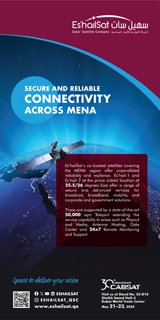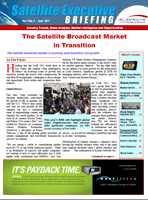GVF MENASAT @ CABSAT 2014 – The Satellite Interference Summit: Keynote Opening with ITU Space Services Department
by Martin Jarrold
Dubai, UAE, March 3, 2014--This month’s column provides updated information about the GVF MENASAT @ CABSAT 2014 – Satellite Interference Summit, which will take place at the Dubai International Conference & Exhibition Centre (DICEC), in Meeting Room Al-Ain F (above Halls 1 and 2), on 12th and 13th March.
As noted in earlier columns, the Summit program at CABSAT 2014 is embedded in the overall event as part of the CABSAT Academy. In 2014 the Summit brings its important value-added content in the form of reflecting and reporting on an important developing private and public sector collaboration to tackle satellite interference issues. GVF has, of course, over several years, taken a strong leadership position both in developing its own initiatives and programs to tackle interference, and also by working in partnership with a wide range of other interested groups and organizations.
The collaboration has included satellite operators, the satellite service solutions provider community, manufacturers of satellite equipment, national broadcasters, and the international broadcasting community as a whole, together with national, regional, and other global organizations, such as the World Broadcasting Unions-International Satellite Operators Group (WBU-ISOG), the satellite Interference Reduction Group (sIRG), the Space Data Association (SDA), and the International Telecommunication Union (ITU). The Summit program will feature contributors from these various organizations. Additionally, most recently, in MENA, GVF has collaborated with the Arab States Broadcasting Union (ASBU) to develop an Action Plan to address the problem of interference, whether unintended or intentional. More on this appears below.
As described in my previous column, the GVF MENASAT @ CABSAT 2014 Satellite Interference Summit falls into two parts: Part 1 of the Summit will focus on “Proactivity”, and look at Challenges & Preventative Measures, and Part 2 will focus on “Reactivity”, and examine Challenges & Mitigation Approaches. The program will include speakers from GVF member organizations, plus the ITU, ASBU, sIRG, Arab Advisors Group, and others.
On 12th March we will begin with an Opening Keynote from Jorge Ciccorossi, Senior Engineer, Space Services Department, International Telecommunication Union, who will address ‘ITU Proactivity and Reactivity to Ensure Interference-Free Satellite Services’. The keynote will begin by offering an overview of the ITU and international radio communications regulatory framework, and a statistical breakdown of the instances of harmful interference received by the Radiocommunications Bureau of the Union. Jorge Ciccorossi will continue by profiling the ITU’s role and actions in preventing interference to satellite systems, from planning, to study groups, other preparatory work and the World Radiocommunications Conference (WRC). The presentation will continue with an examination of the use of Radiomonitoring and the ITU International Monitoring System (IMS), how to report an event of harmful interference to the ITU, introduce the New ITU Recommendations on Access Procedures to access FSS GSO Occasional Use in C and Ku bands, and the current status of development of the New ITU Recommendation on Carrier ID, as well as other related projects under study at the ITU.
An Arab Advisors Group keynote will follow the ITU opening. Jawad Abbassi, Founder & General Manager of Arab Advisors will provide an overview of Arab telecom markets around the region, delving into competitive analysis and adoption levels on a country-by country level, examine telecom and media convergence across the region, analyze broadcasting trends in regional free-to-air satellite and satellite Pay TV in the Arab World, and the emergence of HD broadcasting in the region.
As at the date of writing this column the draft Summit program will continue with the following contributors (details of the final timings of the sessions will be found by clicking on the ‘Conferences’ tab at www.cabsat.com):
12th March 2014 | 13:00 to 17:50 | Al-Ain F Meeting Room
The Satellite Interference Summit – Part 1: Challenges & Preventative Measures
Summit Welcome & Opening Remarks
Martin Jarrold, Chief, International Program Development, GVF
International Telecommunication Union Opening Keynote
ITU Proactivity and Reactivity to Ensure Interference-Free Satellite Services
Jorge Ciccorossi, Senior Engineer, Space Services Department, International Telecommunication Union
Arab Advisors Group Keynote
MENA’s Satellite Broadcast & Telecoms: An Overview of Today’s Market Environment
Jawad Abbassi, Founder & General Manager, Arab Advisors Group
Improper Installations and Training & Certification
Yasser Hassan, Director, Transmission Operations, Arabsat
Thomas Lohrey, Head of Systems Integration, Eutelsat
Mazen Nassar, Chief Executive Officer, MenaNets; Master Trainer, MENA, GVF Training
Wireless Interference and Spectrum Security Initiative
Kumar Singarajah, Director, Regulatory Affairs & Business Development, Avanti Communications
Other Speakers tbc
Sub-Standard Equipment and Product Quality Assurance
Thomas Lohrey, Head of Systems Integration, Eutelsat
Other Speakers tbc
Information Sharing and Geolocation & Space Data
Karl Reddy, General Manager, Customer Service Operations, SES
Other Speakers tbc
13th March 2014 | 13:00 to 17:30 | Al-Ain F Meeting Room
The Satellite Interference Summit – Part 2: Challenges & Mitigation Approaches
Summit Welcome & Opening Remarks
Martin Jarrold, Chief, International Program Development, GVF
Access Partnership Keynote
MENA’s Regulatory-Interference Interface: Addressing Interference Matters & Avoiding Interference Incidents
Laith Hamad, Policy Analyst, Abu Dhabi office, Access Partnership
Deliberate Interference and the Arab States Broadcasting Union (ASBU) Tunis Action Plan: Implementing Solutions for MENA
- Awareness
- Training
- Earth Station Approvals
- Carrier ID
- Regulatory and Political Actions
Abdelrahim Suleiman, Technical Director, Arab States Broadcasting Union
Jorge Ciccorossi, Senior Engineer, Space Services Department, International Telecommunication Union
Unidentified Carriers and Carrier ID
Steven Soenens, Vice President, Product Management, Newtec
Guido Baraglia, Sales Director, EMEA, Sat Corporation
Gez Draycott, Senior Manager, Sales Engineering, SES
Dysfunctional Networks and Network Validation
Karl Reddy, General Manager, Customer Service Operations, SES
Other Speakers tbc
Summit Closing Remarks
Martin Jarrold, Chief, International Program Development, GVF
To begin Day Two (13th March) of the Summit, Laith Hamad, Policy Analyst at the Abu Dhabi office of Access Partnership, will offer a presentation which will profile the regulatory environment for VSATs/ESVs/AES/etc, and will go on to analyze the MENA region’s growth in interference complaints in recent years, some of the ways the international community may address interference matters, together with recommendations on avoiding interference.
Also, as noted above, the second day of the program will feature discussion of the ASBU Satellite Interference Action Plan which was formulated in Tunis on 6th & 7th October 2013. The Action Plan, in summary, features the following elements which will come under further discussion and development for implementation during the GVF MENASAT @ CABSAT 2014 Satellite Interference Summit. The full Action Plan is too lengthy to represent here in full, and any interested parties are invited to register their intention (by contacting me at martin.jarrold@gvf.org) to attend the Summit in Dubai on 12th and 13th March.
![]() Awareness – ASBU and operators in the MENA and other regions to establish a public awareness campaign, through different Mass Media, that intentional interference will not prevent the Media message to be delivered, as the broadcasters affected will move and find other alternatives (use of another satellite or other frequencies or even other means of Media). Broadcasters in the Region should as well use their access to media to publicize the impact of satellite interference on broadcasting.
Awareness – ASBU and operators in the MENA and other regions to establish a public awareness campaign, through different Mass Media, that intentional interference will not prevent the Media message to be delivered, as the broadcasters affected will move and find other alternatives (use of another satellite or other frequencies or even other means of Media). Broadcasters in the Region should as well use their access to media to publicize the impact of satellite interference on broadcasting.
![]() Training – ASBU and operators in the MENA region and other regions to establish short and medium training Plans for all broadcasters to ensure the best practice in operation and maintenance of the satellite uplinks systems with the objective of reducing significantly the number of interference incidents. Training to be delivered using ASBU, GVF and other recognized training plans and including the SNG module developed jointly with RFI-EUI, as well as specialized training for satellite Operations/NOC etc.
Training – ASBU and operators in the MENA region and other regions to establish short and medium training Plans for all broadcasters to ensure the best practice in operation and maintenance of the satellite uplinks systems with the objective of reducing significantly the number of interference incidents. Training to be delivered using ASBU, GVF and other recognized training plans and including the SNG module developed jointly with RFI-EUI, as well as specialized training for satellite Operations/NOC etc.
![]() Earth Station Approvals – ASBU and operators in this region and other regions to request that SNG terminal equipment be tested and approved for use in coordination with GVF’s Quality Products Framework, which has been endorsed by RFI-EUI and the World Broadcasting Unions-International Satellite Operations Group (WBU-ISOG) in order to reduce interference caused by faulty satellite newsgathering equipment.
Earth Station Approvals – ASBU and operators in this region and other regions to request that SNG terminal equipment be tested and approved for use in coordination with GVF’s Quality Products Framework, which has been endorsed by RFI-EUI and the World Broadcasting Unions-International Satellite Operations Group (WBU-ISOG) in order to reduce interference caused by faulty satellite newsgathering equipment.
![]() Carrier ID – ASBU and operators to request members and all users in the MENA region to implement carrier ID in line with WBU-ISOG resolutions and to record the progress of this change. All Broadcasting Unions and members to engage with national regulators to make CID a requirement.
Carrier ID – ASBU and operators to request members and all users in the MENA region to implement carrier ID in line with WBU-ISOG resolutions and to record the progress of this change. All Broadcasting Unions and members to engage with national regulators to make CID a requirement.
![]() Regulatory and Political Actions – ASBU, WBU, satellite operators and all concerned parties recognize the actions of ITU, Radio Regulations Board and TSB, in order to tackle the issue of intentional interference. Their continued support is requested to develop these initiatives. ASBU and WBU will also consider whether it is appropriate for action to be taken by other competent UN bodies such as UNIDIR (United Nations Institute for Disarmament Research) and others.
Regulatory and Political Actions – ASBU, WBU, satellite operators and all concerned parties recognize the actions of ITU, Radio Regulations Board and TSB, in order to tackle the issue of intentional interference. Their continued support is requested to develop these initiatives. ASBU and WBU will also consider whether it is appropriate for action to be taken by other competent UN bodies such as UNIDIR (United Nations Institute for Disarmament Research) and others.
Further information about the GVF MENASAT @ CABSAT 2014 Satellite Interference Summit can be found by clicking on the ‘Conferences’ tab at www.cabsat.com. Register your intention to participate in the Summit by contacting me at martin.jarrold@gvf.org.
---------------------------------
 Martin Jarrold is the Chief of International Program Development of the GVF. He can be reached at: martin.jarrold@gvf.org
Martin Jarrold is the Chief of International Program Development of the GVF. He can be reached at: martin.jarrold@gvf.org





